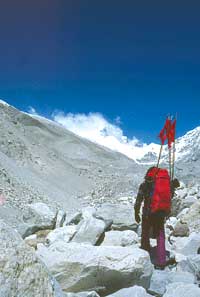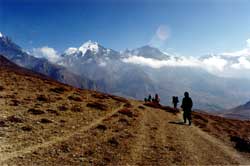 Despite assurances from the Maoist leadership that tourists will not be targetted, recent instances of extortion from mountaineering and trekking groups in Nepal have raised fears that local cadre have their own fund-raising agenda.
Despite assurances from the Maoist leadership that tourists will not be targetted, recent instances of extortion from mountaineering and trekking groups in Nepal have raised fears that local cadre have their own fund-raising agenda. Nepal's tourism industry, already hit by a global recession, regional tensions and bandhs in Kathmandu, is expected to be adversely affected as news of the incidents spreads through the Internet.
"Climbers are an adventurous lot, but if you get more incidents of extortion, then people will just go elsewhere," says Tashi Jangbu Sherpa, president of the Nepal Mountaineering Association.
To be sure, there have been stray incidents of Maoists and criminal elements called khaobadis robbing tourists in the past three years. But tour guides and their agencies who paid up had played down the "donations" fearing that the publicity would hurt business. But now the sums demanded have gone up and local companies can no longer absorb the new costs.
Trekkers in Humla were recently forced to pay $50 each before being allowed to proceed, a trekking group has been forced to pay a Maoist "tax" on the Kangchenjunga trail, rafting companies say Maoists now come to camp at night and demand a similar fee. The Jiri trail is infested with Maoists, and although trekkers have never been harmed, they have been accosted and asked to pay up. However, no extortion has been reported in popular trekking areas like the Annapurnas and Mt Everest.
Even in Chitwan, there have been incidents where Maoists have paid midnight visits to camps demanding up to Rs 100,000. Later on, tour leaders heard they were local youth pretending to be Maoists.
 The most recent incident that got the most publicity because it went out on the internet was the mass-extortion of money from three expeditions bound for Makalu. On 5 April, five heavily-armed Maoists carrying grenades and rifles came into their camps in the village of Sedua three days north of Tumlingtar and demanded Rs 5,000, cameras, binoculars and altimeters. After some discussion, they settled for Rs 10,000 per member. An email from Makalau base camp by American climber R D Caughron said Swiss and Spanish expeditions were also forced to pay up.
The most recent incident that got the most publicity because it went out on the internet was the mass-extortion of money from three expeditions bound for Makalu. On 5 April, five heavily-armed Maoists carrying grenades and rifles came into their camps in the village of Sedua three days north of Tumlingtar and demanded Rs 5,000, cameras, binoculars and altimeters. After some discussion, they settled for Rs 10,000 per member. An email from Makalau base camp by American climber R D Caughron said Swiss and Spanish expeditions were also forced to pay up. The Trekking Agents Association of Nepal (TAAN) said in a statement: "To collect money from tourists, the few that are still coming despite the current situation, will further undermine the future of Nepal's tourism." It demanded that the Maoists return the money to the expedition.
Security sources say Maoist militia who have been pushed to higher altitudes because of military operations in the valley could be getting desperate for funds and therefore forced to rob tourists.
Most trekking agencies in Kathmandu have been hit doubly hard. Not only have they suffered from a decline in bookings, but they have also been victims of extortion from their Kathmandu offices. "The publicity from trekkers being robbed is going to hit us even more," admitted one trekking agent.
Expedition organisers have been pulling back from vulnerable areas in recent years. Highland Excursions, which handles largely Australian trekkers says it has seen a 50 percent decline, and has pulled out of Dolpo, Manaslu, Humla and most recently from the Kangchenjunga area. "We'll have to lay of staff, or even close down, if current trends continue" says Uma Khakurel of Highland Excursions.
Khakurel considers herself fortunate that none of her groups or guides have been confronted by Maoists, so far. "We just advise our guides to keep to main trails and avoid confrontation." She is now directing her tourists to the Annapurna and Everest regions.
Ang Tshering Sherpa, chairman and managing director of Asian Trekking, which currently has more than half-a-dozen climbing groups in Nepal and nearly two dozen in Tibet, has gone out of his way to make the best of things. "One has to go to the source. Go and meet clients in their home countries and tell them the facts-that there is a problem but so far no tourists have been hurt. Relying on correspondence, email, and news reports, which sometimes exaggerate reality, doesn't help." Sherpa acknowledges that apart from appealing to the Maoists, government, and political parties, there's little else one can do.


